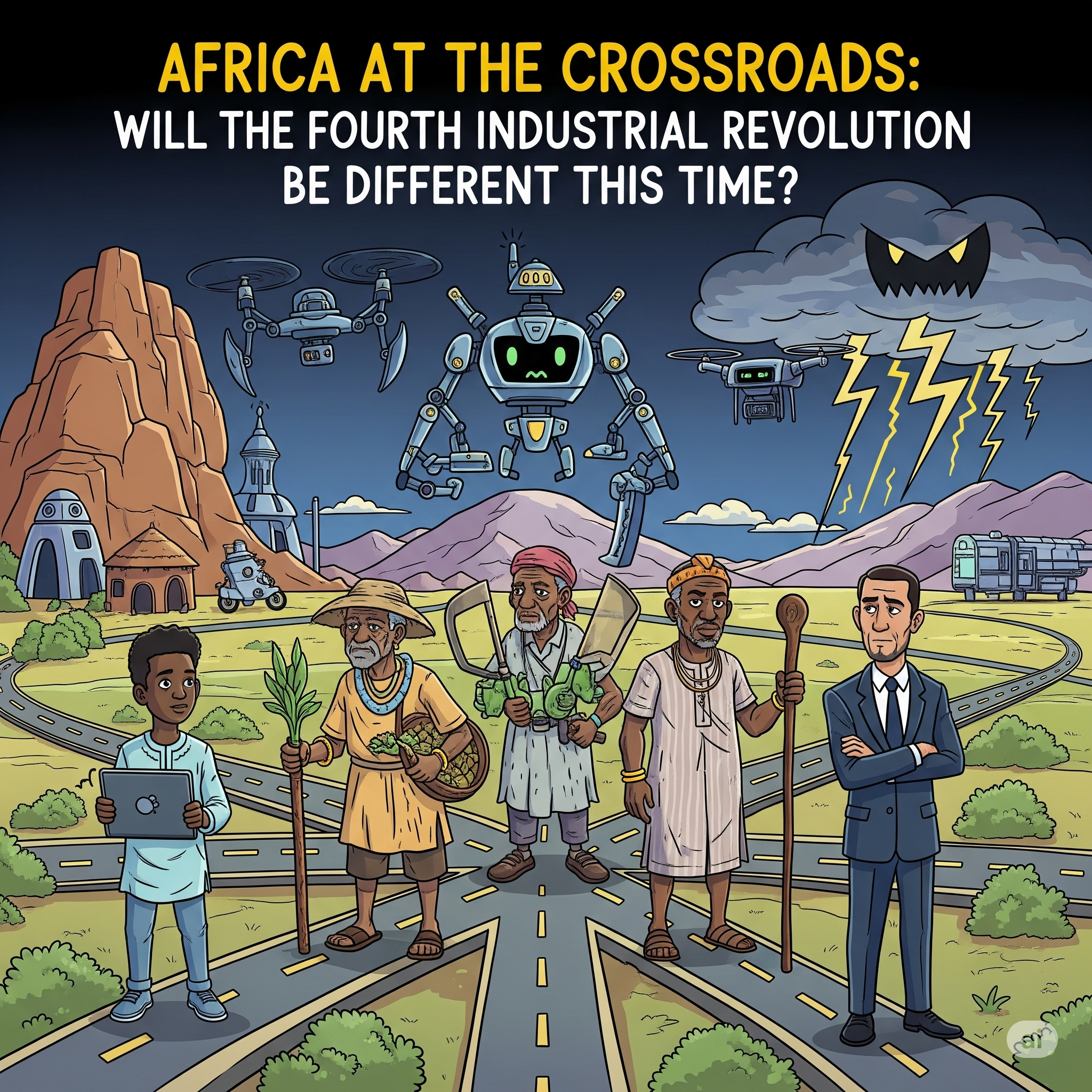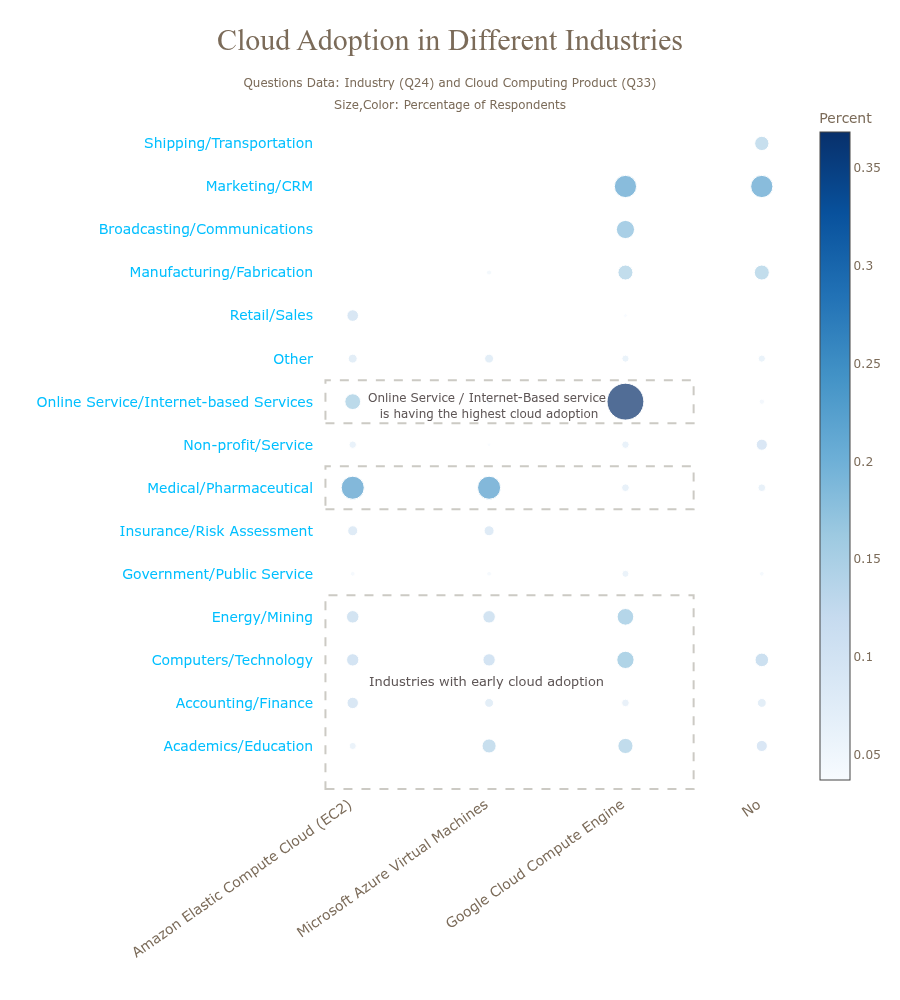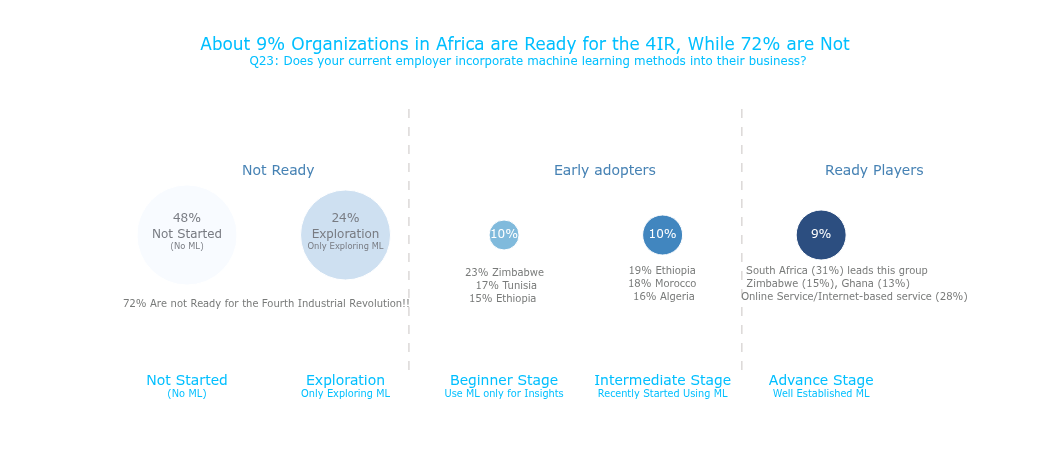Africa at the Crossroads: Will the Fourth Industrial Revolution Be Different This Time?

Introduction: The Stakes of the 4IR for Africa
The Fourth Industrial Revolution (4IR) marked by breakthroughs in AI, cloud computing, robotics, IoT, and blockchain—is reshaping economies worldwide. For Africa, a continent historically sidelined in previous industrial revolutions, this moment presents both an unprecedented opportunity and a critical challenge.
With 16% of the world's population but only 1% of global billion-dollar tech firms and 4% of global GDP, Africa cannot afford to miss this wave. The question is: Will the continent finally embrace the 4IR, or will it fall further behind?
The Transformative Potential of 4IR in Africa
The 4IR could be a game-changer for Africa, offering:
- Economic growth & structural transformation
- Poverty & inequality reduction
- Modernized agriculture & agro-industries
- Improved healthcare & human capital development
- Financial inclusion through digital services
But to realize this potential, Africa must first overcome key barriers starting with AI and cloud computing adoption, the backbone of the 4IR.
Africa's AI & Cloud Computing Landscape: A 2022 Kaggle Survey Deep Dive

To assess Africa's readiness, I analyzed Kaggle's 2022 Data Science & Machine Learning Survey, focusing on responses from African professionals. Here's what the data reveals:
1. Industry Adoption: Leaders vs. Laggards
| Industry | AI/ML Adoption Level | Key Challenges |
|---|---|---|
| Online Services / Internet-Based | Highest | Benefits from rising internet penetration (570M users by 2022) |
| Medical/Pharmaceuticals | Moderate | Leading in Responsible AI due to ethical concerns |
| Retail/Sales | Lowest | Struggles with data scarcity, low digital adoption, and skill gaps |
Key Insight: Online services thrive due to expanding connectivity (internet users doubled since 2015). Retail lags because <40% of Africans shop online, limiting AI training data.
2. Company Size Matters: Big Firms Lead
- Large firms (250+ employees) dominate AI adoption.
- Small firms (0-249 employees) struggle with limited budgets, fewer data scientists, and early-stage experimentation.
Why? Economies of scale make AI investments feasible for big players. Startups & SMEs face high costs, talent shortages, and infrastructure gaps.
3. Cloud & Data Infrastructure: The Foundation of 4IR
- Top Cloud Adopters: Online Services, Medical, Energy, Finance
- Most Used Cloud Storage: Google Cloud (leading), AWS, Azure
- Biggest Hurdle: Latency issues due to few local data centers
Critical Need: More African-based cloud infrastructure to reduce reliance on overseas servers.
4. Business Intelligence (BI) & AutoML: Emerging Trends
- Microsoft Power BI dominates, followed by Tableau.
- AutoML adoption remains low—most firms still rely on manual ML workflows.
The Ethical AI Imperative: Can Africa Build Trust in AI Systems?
As AI spreads, ethical concerns grow:
- Bias in algorithms (e.g., healthcare misdiagnoses)
- Job displacement fears
- Data privacy risks
Where Responsible AI is Emerging:
- Healthcare: Strict ethical frameworks to prevent misdiagnosis.
- Finance: Fraud detection with fairness checks.
- Government: AI policy task forces (e.g., Kenya, Egypt).
Key Risks in Medical AI (From the Study):
- Black-box decisions (unexplainable AI)
- Automation complacency (doctors over-trusting AI)
- Reinforcement of outdated practices (AI trained on old data)
Solution: Stronger AI governance frameworks at national and continental levels.
Country Spotlight: Who's Leading, Who's Lagging?

South Africa
Leader - Home to AI firms like Cortex Logic
Egypt
Policy Pioneer - Leads African Union's AI Working Group
Kenya
Startup Hub - Government AI/Blockchain Taskforce
Algeria
Early Stage - New AI engineering programs (2020-2030)
Takeaway: South Africa & Egypt are setting the pace. Others must accelerate or risk falling behind.
The Skills Gap: Africa's Biggest 4IR Challenge
The Problem:
- <4% of Africans hold university degrees.
- STEM education lags behind global standards.
- High school dropout rates (~30%) worsen the talent shortage.
Solutions in Motion:
- Egypt's "Interactive Classrooms" (digital education push)
- AfDB's "Coding for Employment" (tech skills training)
- Kenya's AI taskforce (policy-driven growth)
What's Needed Next:
- Mandatory primary education to reduce dropouts.
- Industry-aligned STEM curricula.
- Upskilling for informal workers & adults.
Conclusion: Can Africa Seize the 4IR?
The Verdict: Yes, but only with urgent action.
3 Critical Steps for Africa's 4IR Success:
- Expand Digital Infrastructure (local data centers, affordable internet)
- Invest in AI Education & Policy (national strategies, ethical frameworks)
- Support Startups & SMEs (funding, cloud access, talent pipelines)
The 4IR won't wait—Africa must move fast or risk another missed revolution.
Call to Action
🌍 Which African country do you think will lead the 4IR?
💡 What's missing in Africa's tech education system?
